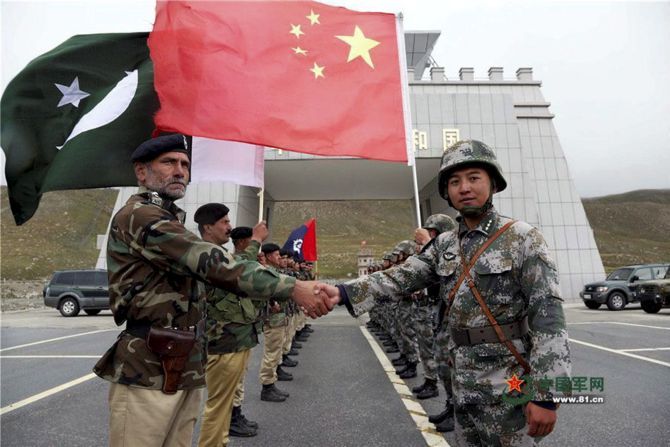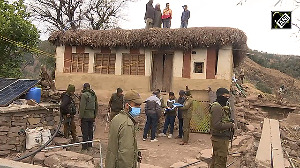
China's closer and enhanced relationship with Pakistan is putting considerable strain in India-China relations, says former RA&W officer Jayadeva Ranade.
The events of recent months have imposed a strain on India-China relations. To a considerable extent these have been motivated by China's closer and enhanced relationship with Pakistan over the past year and especially since the announcement of the China Pakistan Economic Corridor.
The most recent instance was the report on July 21 in the Chinese Communist Party's official journal People's Daily, of the conduct of a joint border patrol by Chinese and Pakistani border troops along the borders of China's troubled Xinjiang-Uyghur Autonomous Region.
The People's Daily published a 12-photograph pictorial report depicting soldiers from Pakistan and China rather obviously posing for photographs at various locations along that border.
The caption for these photographs reads: 'A frontier defence regiment of the PLA (People's Liberation Army) in Xinjiang, along with a border police force from Pakistan, carries out a joint patrol along the China-Pakistan border.'
Pertinent is the description by the People's Daily of the area patrolled by these troops as the 'China-Pakistan border' and not as the Chinese official media usually calls it 'Pakistan-administered Kashmir.'
The area is, in fact, correctly the frontier region of Pakistan-occupied Kashmir, which is an integral part of Indian territory.
China's Xinjiang-Uyghur Autonomous Region does not have any border with Pakistan, but has a common border with PoK.
This effort to begin 'bending' the Line of Control between India and Pakistan commenced last year after announcement of the CPEC. A report in the Pakistan newspaper Dawn on January 7, revealed Pakistan's plans to unilaterally upgrade the 'legal' status of the disputed Gilgit Baltistan region.
Pakistan, it said, planned to give these two administrative entities considerably enhanced legislative powers, control over their revenue and allow them to be represented in Pakistan's federal parliament by two members for the first time, albeit as observers.
A senior 'government' official from Gilgit Baltistan described the move as intended to give legal cover to proposed Chinese investments since 'China cannot afford to invest billions of dollars on a road that passes through a disputed territory claimed both by India and Pakistan.'
China had indicated its position on Gilgit Baltistan as early as the 1980s since when its official media has referred to this as Pakistani territory. The People's Daily report needs to be viewed against this backdrop.
There are politico-military aspects to the joint patrol and the People's Daily report as well.
The patrol, so far the first of its kind reported in this portion of the Xinjiang-Uyghur Autonomous Region bordering PoK and Afganistan, continues the 'Friendship' series of anti-terrorist exercises held earlier by China and Pakistan.
It implies that the Pakistani armed forces and Chinese authorities will cooperate in the apprehension of Uyghurs seeking to cross China's land borders.
It also points to the Chinese and Pakistani armed forces planning increased coordination in the future as borne out by the laying of a secure fibre-optic cable linking the PLA's Xinjiang military district in Kashgar with the Pakistan army GHQ in Rawalpindi.
It, additionally, gives PLA personnel an opportunity for terrain familiarisation, which is important given that the PLA's new Western Theatre Command, or West Zone, includes in its area of operational responsibility the safeguarding of China's borders with Afghanistan, Pakistan and India as well as protecting the CPEC.
The involvement of Pakistan army personnel would be useful to help China try and assuage the concerns of Islamist fundamentalist groups in Pakistan that Beijing is not implementing harsh, repressive policies in Xinjiang.
The warning issued by Islamic State last year and Lashkar-e-Tayiba chief Muhammad Sayeed's threat this May to the Pakistan government to warn China against the ill treatment of Muslims in Xinjiang would have been factors contributing to the decision to conduct joint patrols.
These exercises could be a prelude to increased activity by the PLA and the Pakistan army in this sensitive area.
Jayadeva Ranade, a former additional secretary in the Cabinet Secretariat, Government of India, is president, Centre for China Analysis and Strategy.











 © 2025
© 2025